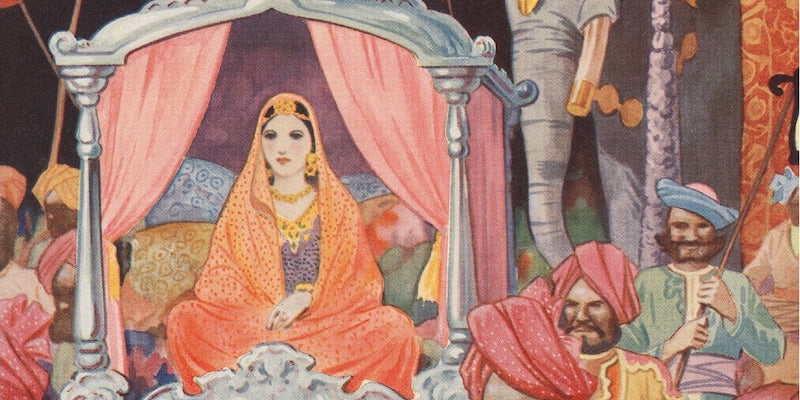A Rich But Rare Genre: Exploring Islamic Historical Fiction
Jamila Ahmed Recommends Tariq Ali, Leila Aboulela, Suad Amiry, and More
I started writing my novel, Every Rising Sun—a retelling of the story of Scheherazade from the 1001 Nights set during the Golden Age of Islam and spanning from medieval Persia to Palestine—when I was seventeen years old. At that time, the United States was waging unjust wars in Afghanistan and Iraq and anti-Muslim bigotry coursed through all levels of American society. Even as a teenager, I felt the absence of novels recounting Islamic history.
While Western presses churn out (often very good!) books about the Tudors or Ancient Greece, fiction that explores Islamic history is almost nonexistent. This is a shame. At an entertainment level, Islamic history is fascinating—covering diverse cultures from Africa, Europe, and Asia and brimming with rich drama.
But more importantly, one of the great pleasures and values of reading is that it can expand the reader’s horizons, challenge their preconceived notions, and teach about a people, culture, or religion they might not have known about before. In other words, good literature can humanize its subjects and opens the reader’s eye and heart.
We have seen over and over again that the global dehumanization, and indeed, demonization, of Muslims, and the willful misunderstanding of Islam and its history, can result in real world atrocities. We are seeing it now. Israel is slaughtering the people of Palestine whom the Prime Minister of Israel dubs with old colonial canards like “the children of darkness” while Western governments vacillate between cheerleading and the occasional impotent handwringing.
We have surpassed one hundred days of this genocide. Yet, most Western leaders refuse to see Palestinians (whether Muslim or not) as people worth demanding peace and justice for.
As I grieve for the martyrs of Palestine, I continue to believe–I must believe–that telling and reading stories that center Muslims and Islamic history can help counter some of these bigotries. Such stories underscore that we are a diverse community, an ummah, with a rich history, with virtues and flaws, who love and struggle and survive just like anyone else.
It is not enough—not without a ceasefire, not without a free Palestine. But it is something.
*

Suad Amiry, Mother of Strangers
Mother of Strangers is based on a true love story that begins in a cosmopolitan and bustling Jaffa in the waning days of the British Mandate of Palestine. Fifteen-year-old Subhi has set his heart on Shams. But as Zionist forces bomb Jaffa to cause the mass displacement of Palestinians, what begins as a simple teenage love story becomes a moving account of Palestinian expulsion and survival through the violence of the Nakba.

Tariq Ali, Shadows of the Pomegranate Tree
The first book in a remarkable quintet, Shadows of the Pomegranate Tree is set in sixteenth century Granada, Spain, after the fall of the Moorish kingdom and during the Spanish Reconquista. It depicts the disintegration of a multi-faith society through the experience of the Banu Hudayl family.
As Spain tightens its grip on Granada, Ali shows the brutality with which Moorish rule over Spain was ended and how it tears apart not only a kingdom and its communities but a family.

Leila Aboulela, River Spirit
River Spirit is set in 1890s Sudan and at its heart is the story of an enslaved Sudanese orphan, Akuany, who must navigate a world where the British Empire is wresting control of Sudan from the Ottomans and a Sudanese leader dubbed the Mahdi (Savior or Messiah) launches a resistance movement against the country’s imperial overlords. Sudanese resistance to colonization intertwines with the lives of Akuany and the family for whom she works.

Tania James, Loot
Loot starts in eighteenth century India, in the court of Tipu Sultan. After the British conquer Mysore and kill Tipu Sultan, the novel takes its primary character, a talented woodcarver called Abbas, to France and then England, using a mechanical tiger as a vessel through which to explore colonization, invention, and theft.

Kenize Mourad, In the City of Gold and Silver
In the City of Gold and Silver recounts the story of Begum Hazrat Mahal, the Queen of Awadh in India, an orphan who became the fourth wife of an Indian king. The novel focuses on Hazrat Mahal’s role as a freedom fighter during India’s first War of Independence against the British East India Company in 1857, where she led an army of Muslims and Hindus in an ultimately unsuccessful effort to oust the British from India.

Abdulrazak Gurnah, Afterlives
Afterlives is built around a family, bound through adoption and marriage, in coastal Tanzania during German colonial rule in the late nineteenth century through the middle of the twentieth century. Afterlives charts the course of the region’s history, with characters swept up as soldiers for the German army in World War I, who in the aftermath of war, must learn to love and survive and overcome the traumas of battle and colonization.

Adania Shibli, Minor Detail
No recent book better exemplifies the revolutionary nature of humanizing the systemically dehumanized than Adania Shibli’s Minor Detail. The book tells the story of a Palestinian girl who is raped and murdered by Israeli soldiers in the aftermath of the 1948 Nakba–the forcible removal of Palestinians from Palestine to allow for Israel’s creation.
This year, the Frankfurt Book Fair canceled an award ceremony set to honor Shibli, citing the “war in Israel“—a choice that only underscored the dehumanization and collective guilt placed onto Palestinians, conduct which has no place in art or literature.
______________________________

Every Rising Sun by Jamila Ahmed is available via Holt.




















